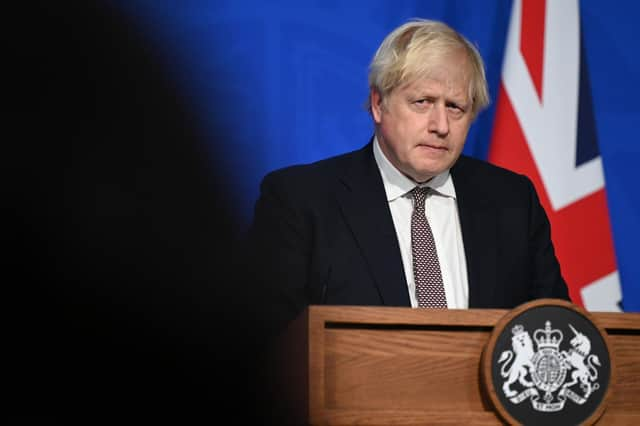Boris Johnson chastened by sleaze scandal but economy matters more - Bill Carmichael


A chastened Prime Minister told a meeting of Conservative backbenchers this week that he had “crashed the car” by trying to tear up the rule book to save the skin of an MP who had been found breaking lobbying regulations.
That resulted in a fortnight of damaging headlines about sleaze, a massive dip in the opinion polls and widespread dissatisfaction among his own MPs, particularly among those representing “red wall” seats in the Midlands and the North.
Advertisement
Hide AdAdvertisement
Hide AdThe fact that no one saw this train crash coming says a lot about the judgment not just of the Prime Minister, but other senior ministers and advisers.
I have heard numerous commentators in recent days saying the last fortnight has been the worst for any government in recent memory, but I beg to differ. I am old enough to remember the unmitigated disaster of Black Wednesday back in 1992 when the pound crashed out of the Exchange Rate Mechanism.
I was working on the news desk of The Yorkshire Post at the time, and I vividly recollect an astonished group of journalists gathering around a television as John Major’s Conservative government tried, and failed, to shore up the plummeting pound by jacking up interest rates to staggering levels.
Speculators, such as George Soros, made an absolute killing that day, but for ordinary people and Yorkshire’s business community it was a calamity that cost our country more than £3bn.
Advertisement
Hide AdAdvertisement
Hide AdAt one point during that frenzied morning I recall fielding a call from the chief executive of a leading Yorkshire company asking: “Is it true that they’ve put interest rates up to 12 per cent?”
“Yes,” I replied, “and they say they are going to put them up again to 15 per cent.”
I am afraid his astonished response is not fit to retell in a family newspaper.
For the moment Johnson will survive. There is little chance of an early general election and no credible challenge to his leadership within the Conservative party, at least at the moment. He has also managed to kick the damaging issue of second jobs for MPs into the long grass, with some vague proposals for cutting back on “political consultancies” expected sometime next year. Speaking as someone who at one point in my career had no fewer than six jobs, I am pretty relaxed about MPs taking on work outside Parliament – so long as they do not use their public office for private gain.
Advertisement
Hide AdAdvertisement
Hide AdThe practice is widespread throughout the various parties, with for example both Conservative MP Geoffrey Cox and Labour leader Keir Starmer earning extra cash from legal work. Other MPs work as doctors and care workers, and you could argue that such outside interests bring valuable real world experience to our political representatives. What matters is that the rules are clear and those MPs that break them are dealt with by an independent regulator, without any cack-handed interference from the government of the day.
The much more difficult question is what all this means in the long term, and I am afraid the honest answer is we don’t know yet.
But perhaps the events of Black Wednesday can give us a few clues. After the Winter of Discontent and James Callaghan’s Labour government going cap in hand to the IMF to beg for a loan, the Conservatives, under Margaret Thatcher, built a reputation for economic competence that delivered four consecutive general election victories.
The chaos of Black Wednesday blew that reputation to smithereens, and Labour under Tony Blair was elected in a landslide in 1997. The Conservatives lost three elections in a row, and did not return to power for 13 years.
Advertisement
Hide AdAdvertisement
Hide AdYes, “Tory sleaze” – remember the “cash for questions” scandal? – played a part back then, but it was the efforts of Blair and Gordon Brown to convince voters they could be trusted on the economy that was the decisive factor.
The economy matters above all. Food for thought for both Johnson and Starmer.
